Barbara left school in 1914, and during the First World War initially worked on the land in Surrey, before joining the British Red Cross VAD in Yorkshire. From 12/12/1917 until 15/02/1919 she worked in Loversall Hall Auxiliary Hospital in Doncaster. Loversall Hall Hospital was opened as a Red Cross Ausiliary Hospital in 1914 by Mrs Sophia Skipwith, who owned the Hall. The Loversall Hall Auxiliary Hospital provided 100 beds. (See Inspirational Women of WW1 weblog for more information about Sophia Skipwith).
After her father's retirement, Barbara lived with her parents in Surrey and began writing. In 1932, she married Commander John Graham Bower (1886 –1940), a retired naval officer. They had no children, but from a previous marriage he had a child - Ursula Graham Bower - who became an anthropologist.
Barbara died in a nursing home in Donnington, Berkshire on 2nd February 1976. Her stepdaughter remembered her as "warm and kind", but recalled mainly her "dry – and sometimes wry – sense of humour", the hallmark of her Worzel Gummidge books.
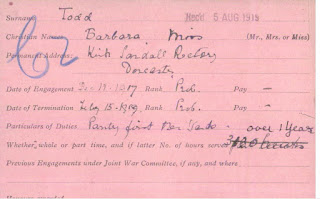 |
| Barbara's Red Cross WW1 record card |
Sources:
https://vad.redcross.org.uk/record?rowKey=209361
https://fantastic-writers-and-the-great-war.com/the-writers/barbara-euphan-todd/
https://wartimememoriesproject.com/greatwar/hospitals/hospital.php?pid=1539
Quite by chance a poem recently written by my friend Linda Copp in America, which she posted on Facebook, led me to look for the author of the "Worzel Gummidge" books. Although Barbara was a poet AND worked as a VAD during WW1, I haven't yet been able to find any WW1 poems by her. If anyone can help please get in touch.
Linda has very kindly given me permission to share her lovely poem with you:
"The Scarecrow" By Linda Copp ©
Mr. Scarecrow, you're much too meek,
you're much too gentle, mild.
You're much too kind to scare a crow
or even shun, a child.
In your funny coat, patched and bright
bluey-greens, and buttons gold.
You haven't any un-lite' spots,
least none I can behold.
A smile is crayoned cross the broom,
that stands out as your head.
Its bristles point the other way,
beneath a hat of red.
And painted on that one time sweep,
a funny face, a smirk,
It isn't quite that mean enough,
to let the scaring work.
Your laughter seems to change it,
into a silly grin.
Your gentle eyes of charcoal,
reflect a glow within.
And glow is what you must do,
your colors, dress, and face,
They turned you from intended stress,
into the scare's disgrace.
For the crows, they fly above you
they light upon your brow.
It seems they mock and mimic you
but, to their taunts, you mustn't bow.
For the children they all love you,
you're their very best of friend.
You give them light and magic,
from that heart that shines within.
And so, as straw arms reach out,
to children, love and care,
It's really then no wonder,
My scarecrow, you can not scare.
And though you feel a failure,
so often at your job,
You mustn't fall to sighing,
Oh no, You mustn't sob.
For you've achieved a rarer goal,
than once was one day planned,
You've remained yourself, a friend,
straw borders you have spanned.
And no, you needn't worry,
No, you needn't fret,
Though, they can't see your troubled heart,
broken with regret.
Sunshine, is your master.
Scariness is your foe.
The worlds demands you shackled,
by a heart too kind to know,
That cold and darkness have to be,
a part of any day,
That warmth and sunshine often are lost,
forgotten in their way.
Now, though they call you Scarecrow
there's no villain in your soul.
You've failed at what their names implied
but are names the only goal?
For you're one who has to laugh and sing,
scary things, you cannot do.
You have to cheer the dreary skies.
You have to turn them blue.
You can't conceal that silly smile,
that wants to be a friend.
You can't be mean and angry,
you can't a teardrop lend.
No, no, my friend, you mustn't cry.
You mustn't feel you've failed.
For, in the end, you did what's right,
your inner self prevailed.
And this is much more a victory,
then you can now, believe.
You've done a harder, wiser, task,
than any crow, could leave.
Pumpkins, children, and the like
kiss you on this morn.
Thank you for your silly mask,
that couldn't hurt and scorn.
And bless you for your loving heart,
your hand a golden glove,
That managed to maintain the touch
that harvested such love!
By Linda A. Copp © 1970
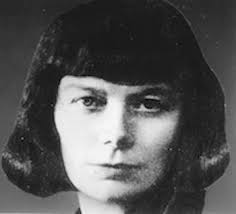



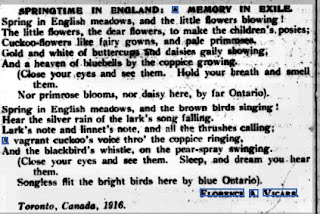













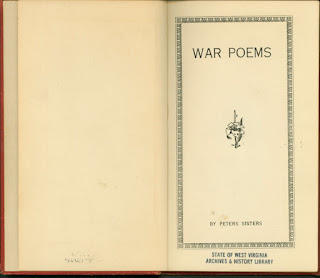

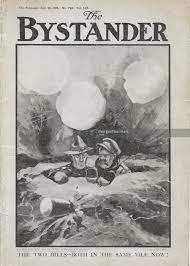

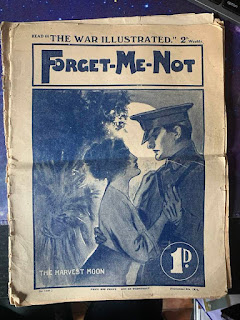

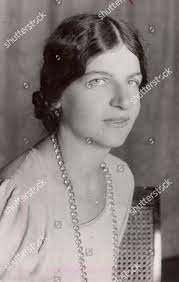


.JPG)

